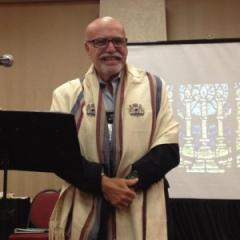
Volunteer of the Month: Cantor Sam Radwine
Sam is a 1981graduate of HUC-JIR- SSM. He is currently the Cantor at Congregation Ner Tamid in Signal HillRancho Palos Verdes, California.
In what capacity have you volunteered for the ACC, and how did you get involved in doing volunteer work?
I was active on the board in the mid-1980's, but not as much in recent years. My earlier jobs were coordinating activities in the southwest region. I chaired and co-chaired a number of regional retreats that we used to have. I was also the chair of the 2000 convention. It (e.g. volunteer work) got started on a regional level. When I first came to the Los Angeles area we had an active ACC group of full and associate members. We used to meet on a regular basis and that was the beginning of our retreats. I enjoyed the camaraderie of my colleagues, and it gave us a chance to get out of our slots and see what other people were doing. I really enjoyed that. At the peek of my activity I was involved in membership and the former certification process.
What's the most rewarding part of doing volunteer work?
I would say the interaction with colleagues and networking. You gain a lot of support by speaking to them and interacting with them. It helps strengthen the organization and the stature of the Cantor. And also individual work, the perspective you gain from seeing others’ work.
What is the best part of being a Cantor? What's the most enjoyable part of your career?
The sharing of experiences in people's lives. It's incredible to share in peak experiences and the sadnesses, too. To be with those people in their peak moments. It's gratifying and an honor.
What do you see as the biggest challenge facing the cantorate, looking forward into the future?
The changing nature of the synagogue and the Jewish community. There was a quote I heard, it goes like this: “we are madmen living in a modern family world.” Needs of change in the rapid nature of the Jewish community, and the bricks and mortar synagogue. As Cantors, like other Jewish leaders, we need to be on the cutting edge of leadership, and in the direction that our Jewish communities evolve. It's a challenge. How do we make things relevant?
What influenced you to become a Cantor?
I grew up under the tutelage of a Rabbi who was a kol bo, and the music stuck with me. It was the marriage of music and spirituality that got to me. I started as a music educator. I came into the cantorate as a teacher, not necessarily a performer.
Tell us one thing about yourself that we might not know, that you would want us to learn about you.
I'm on the eve retirement. My husband and I have moved to Palm Springs. We are looking forward to entering the next phase of our lives.
And do Cantors truly really retire?
I'm on faculty of the Academy of Jewish Religion of California and I will continue teaching at AJRCA in the Cantorial school.

